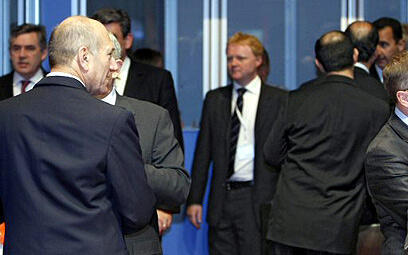PARIS – With no handshakes, indirect messages are more direct than ever: Prime Minsiter Ehud Olmert and Syrian President Bashar Assad were present in the same hall Sunday as part of a Mediterranean summit in Paris.
The two met separately with Turkish Prime Minister Recep Tayyip Erdogan and exchanged peaceful messages.
A diplomatic source told AFP that Olmert conveyed a message to the Syrian president. "The dialogue is still mediated, but it is conducted by high-ranked officials," he said.
A Syrian source denied, however, that such a message was conveyed to the Syrian leader.
The prime minister's foreign press spokesman, Mark Regev, said that "Olmert is completely serious about making progress with the Syrians." He stressed that the prime minister hopes to launch indirect talks, saying "it will be a mistake to wait. If there is willingness for negotiations now, this is the time."
Olmert (L) and Assad (R) in Paris (Photo: Reuters)
Despite the join attendance at the conference, Assad refrained from listening to Olmert's speech and left the auditorium before the Israeli prime minister began talking.
Olmert told the conference, "We are in the midst of negotiations with the Palestinians. We will continue the negotiations, they are important, they are serious, they are being conducted carefully and responsibly.
"I know all those sitting around this table, and many who are not here, led by the United States, want us to succeed in reaching a deal which will lead to stability, an atmosphere of justice, an atmosphere of relaxation, an end to violence and peace for us and for the Palestinians based on a vision of two states for two people. This is what we want and this is what we'll do with al the Arab states we have yet to sign a peace deal with."
First meeting with Qatar's emir
Among the prime minister's meetings in Paris was a 20-minute meeting with Qatar's emir, Sheikh Hamad bin Khalifa al-Thani. This was the first meeting between the two, who discussed the Israel-Syria and Israeli-Palestinian peace processes. Officials at the Prime Minister's Office said the meeting was held in a pleasant atmosphere.
Olmert also met with the prime ministers of Holland and Spain and is expected to meet with German Chancellor Angela Merkel. According to the prime minister's aides, the world leaders did not express their interest in his political problems and investigations in Israel.
Earlier Sunday, Foreign Minister Tzipi Livni told the 43-nation Union for the Mediterranean conference that "when I look at my neighbors I first of all see human beings facing similar challenges.
"The only way to deal with these challenges is through cooperation. Don't let the region's nations' ability to cooperate be held hostage by political considerations," she said.
Syrian Foreign Minister Walid Muallem left the conference hall in protest before Livni spoke, but several other representatives of Arab countries that do not have diplomatic relations with Israel remained seated.
Livni continued to say that "I know that part of the conference participants view the Israeli-Palestinian conflict as an obstacle on the way to promoting joint projects, but I do not accept this. Cooperation and joint ventures contribute to the leaders' ability to make decisions. We have more common challenges in the region than conflicts."
Assad: 'Normal relations' after agreement
In an interview with the al-Jazeera network in Paris, the Syrian president said his country insists on the return of the entire Golan Heights as part of negotiations with Israel.
He clarified that the future ties between the countries, after a peace agreement is reached, will be "normal relations," his tone implying that the relations won't be of full normalization.
"We should not sink into definitions raised by the West or Israel. For us the word 'normalization' does not exist," Assad stressed. "Ever since the peace process began we spoke of 'normal' relations. They can be named 'natural' or 'normal', but it's not important.
"Normal relations are as the relations between any two states – there are embassies, there are ties and there are agreements. The relations can warp up or cool down. This is part of the sovereignty of each state and we call this 'normal relations.'"
During the interview, the Syrian president denied that there was any military nuclear activity taking place in Iran ,but added he was determined to deliver to Tehran the European demands in regards to its nuclear activity.
"We will launch direct talks with the Iranians immediately after returning to Damascus in order to present them with everything we heard from President Sarkozy, and then we will see what the Iranian response will be."
Olmert said during the regional conference that "Israel and the Palestinians have never been as close to peace as they are now."
"It seems to me that we have never been as close to the possibility of reaching an accord as we are today," Olmert told reporters standing alongside Palestinian President Mahmoud Abbas and French President Nicolas Sarkozy.
During a one-on-one meeting at the Elysee Palace, Olmert promised Abbas that Israel would release additional Palestinian prisoners as a gesture to the Palestinian Authority.
An Israeli state official said however that Olmert did not commit himself to releasing a specific number of prisoners.
AFP and Roee Nahmias contributed to this report


